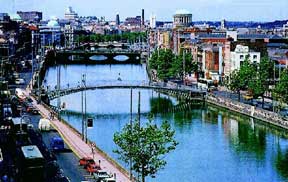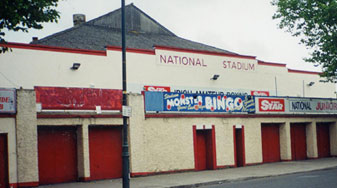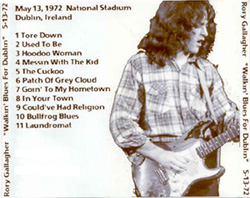Dublin National Stadium --May 13, 1972
Dublin National Stadium --May 13, 1972
 Built on the banks of the River Liffey,
Dublin was named by the Vikings who conquered and then settled on the south bank
of the river in 988 AD, establishing this port city where the river Poddle joined the Liffey
in a "black pool"-or "Dubh Linn".
It would later merge with the Celtic settlement on the
north bank of the Liffey called,Baile Atha Cliath, "Town of the Hurdle Ford" named for an
ancient river crossing there, and still used to this day as the Irish name for Dublin.
Built on the banks of the River Liffey,
Dublin was named by the Vikings who conquered and then settled on the south bank
of the river in 988 AD, establishing this port city where the river Poddle joined the Liffey
in a "black pool"-or "Dubh Linn".
It would later merge with the Celtic settlement on the
north bank of the Liffey called,Baile Atha Cliath, "Town of the Hurdle Ford" named for an
ancient river crossing there, and still used to this day as the Irish name for Dublin.
Rory often played Dublin's National
Stadium, a "strange hall that looks like a cross between a second division Swedish
hockey patch and a hanger on an unused airfield."--Richard Green (New Musical
Express)
 Indeed, Gerard O'Grady (Dublin Evening Press) remarks that, "It is difficult for an artiste
even one who has outstanding ability to create the proper atmosphere in the fading light
of evening and in a drab, colourless hall which is the National Stadium." Yet, Rory did
exactly that time and time again at the National Stadium. The Irish Times review
(May 16, 1972) of this concert states, "Saturday's affair underlined the power of rock in
moving what appear at first to be immovable masses; the audience-involvement with
Rory G. was genuine (I know a real demand from a stoked-up one) and he threw himself
into the work so that it became a two-way thing, though it obviously took a lot out of him.
The group-precision was remarkable (with) nice drum solo work...one of those really
successful Stadium nights."
Indeed, Gerard O'Grady (Dublin Evening Press) remarks that, "It is difficult for an artiste
even one who has outstanding ability to create the proper atmosphere in the fading light
of evening and in a drab, colourless hall which is the National Stadium." Yet, Rory did
exactly that time and time again at the National Stadium. The Irish Times review
(May 16, 1972) of this concert states, "Saturday's affair underlined the power of rock in
moving what appear at first to be immovable masses; the audience-involvement with
Rory G. was genuine (I know a real demand from a stoked-up one) and he threw himself
into the work so that it became a two-way thing, though it obviously took a lot out of him.
The group-precision was remarkable (with) nice drum solo work...one of those really
successful Stadium nights."
 So grab a guinness or two and walk the
historic streets of "Dear, dirty Dublin". Rub shoulders with fellow Dubliners through
streets so narrow people park their cars on the sidewalk. Walk down famed O'Connell
Street, past statues of Joyce, Yeats, Molly Malone and the "Floozie in the Jacuzzi" and
venture down to the southside of Dublin to the National Stadium where Rory plays
rocking blues like no other.
So grab a guinness or two and walk the
historic streets of "Dear, dirty Dublin". Rub shoulders with fellow Dubliners through
streets so narrow people park their cars on the sidewalk. Walk down famed O'Connell
Street, past statues of Joyce, Yeats, Molly Malone and the "Floozie in the Jacuzzi" and
venture down to the southside of Dublin to the National Stadium where Rory plays
rocking blues like no other.
 Built on the banks of the River Liffey,
Dublin was named by the Vikings who conquered and then settled on the south bank
of the river in 988 AD, establishing this port city where the river Poddle joined the Liffey
in a "black pool"-or "Dubh Linn".
It would later merge with the Celtic settlement on the
north bank of the Liffey called,Baile Atha Cliath, "Town of the Hurdle Ford" named for an
ancient river crossing there, and still used to this day as the Irish name for Dublin.
Built on the banks of the River Liffey,
Dublin was named by the Vikings who conquered and then settled on the south bank
of the river in 988 AD, establishing this port city where the river Poddle joined the Liffey
in a "black pool"-or "Dubh Linn".
It would later merge with the Celtic settlement on the
north bank of the Liffey called,Baile Atha Cliath, "Town of the Hurdle Ford" named for an
ancient river crossing there, and still used to this day as the Irish name for Dublin. Indeed, Gerard O'Grady (Dublin Evening Press) remarks that, "It is difficult for an artiste
even one who has outstanding ability to create the proper atmosphere in the fading light
of evening and in a drab, colourless hall which is the National Stadium." Yet, Rory did
exactly that time and time again at the National Stadium. The Irish Times review
(May 16, 1972) of this concert states, "Saturday's affair underlined the power of rock in
moving what appear at first to be immovable masses; the audience-involvement with
Rory G. was genuine (I know a real demand from a stoked-up one) and he threw himself
into the work so that it became a two-way thing, though it obviously took a lot out of him.
The group-precision was remarkable (with) nice drum solo work...one of those really
successful Stadium nights."
Indeed, Gerard O'Grady (Dublin Evening Press) remarks that, "It is difficult for an artiste
even one who has outstanding ability to create the proper atmosphere in the fading light
of evening and in a drab, colourless hall which is the National Stadium." Yet, Rory did
exactly that time and time again at the National Stadium. The Irish Times review
(May 16, 1972) of this concert states, "Saturday's affair underlined the power of rock in
moving what appear at first to be immovable masses; the audience-involvement with
Rory G. was genuine (I know a real demand from a stoked-up one) and he threw himself
into the work so that it became a two-way thing, though it obviously took a lot out of him.
The group-precision was remarkable (with) nice drum solo work...one of those really
successful Stadium nights."
 So grab a guinness or two and walk the
historic streets of "Dear, dirty Dublin". Rub shoulders with fellow Dubliners through
streets so narrow people park their cars on the sidewalk. Walk down famed O'Connell
Street, past statues of Joyce, Yeats, Molly Malone and the "Floozie in the Jacuzzi" and
venture down to the southside of Dublin to the National Stadium where Rory plays
rocking blues like no other.
So grab a guinness or two and walk the
historic streets of "Dear, dirty Dublin". Rub shoulders with fellow Dubliners through
streets so narrow people park their cars on the sidewalk. Walk down famed O'Connell
Street, past statues of Joyce, Yeats, Molly Malone and the "Floozie in the Jacuzzi" and
venture down to the southside of Dublin to the National Stadium where Rory plays
rocking blues like no other.